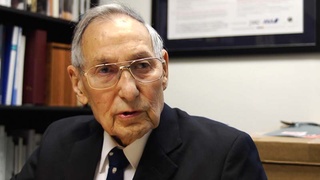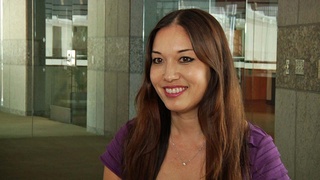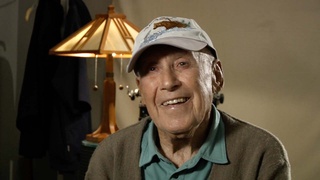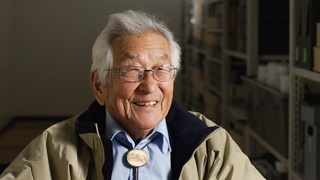Interviews
Her brother’s reasons as a No-No Boy
He had answered “No” to those two questions, because he said, “No, I’m a pacifist, I don’t believe in killing, and therefore I wouldn’t bear arms under any circumstances,” and the second, he said, “No, because I didn’t swear allegiance to the emperor of Japan in the first place, and so why should I forswear allegiance?” And so he answered “No” to the questions. And – as I said, apparently, nobody read the questionnaires after – we had left camp anyway.
So about a year – we were in Cincinnati for about a year, at University of Cincinnati, and the FBI came to his rooming house to ask him, with a copy of his questionnaire, to – if he would change his answers to “Yes.” And I remember Mike said he – said, “No,” he wasn’t gonna change it. And – and I remember yelling at him, I said, “What? Are you crazy?”
Of course he was expelled from the school. Because…the school – well he wasn’t expelled actually; they said that they were doing “sensitive war work on campus,” and therefore, the campus was “off-limits” to him. And so then he was not able to take his final exams at the end of his first year. And so then he failed all his classes. And so then he immediately – he left Cincinnati to go to Boston – he graduated from Boston University later.
Date: August 7, 2018
Location: California, US
Interviewer: Sharon Yamato
Contributed by: Watase Media Arts Center, Japanese American National Museum
Explore More Videos


Writing a novel on the 442nd
Jewish Japanese American journalist

Meeting Hamako in Japan
(1916 - 2013) Member of the U.S. Military Intelligence Service

Meeting Mr. Amano
(1916 - 2013) Member of the U.S. Military Intelligence Service

Marriage and Returning to US
(1916 - 2013) Member of the U.S. Military Intelligence Service

Feeling prejudice while looking for jobs
(1919 - 2015) Nisei who served in World War II with the 442nd Regimental Combat Team

Generosity of the Italians
(1919 - 2015) Nisei who served in World War II with the 442nd Regimental Combat Team

Invited to teach at Harvard by his boss
(1919 - 2015) Nisei who served in World War II with the 442nd Regimental Combat Team

The riot in Manzanar
(b. 1921) Nisei veteran who served in the occupation of Japan

The Dopey bank that survived the war
(b. 1934) Award-winning Disney animation artist who was incarcerated at Topaz during WWII

Evacuated to the Jungle
(b. 1938) Philipines-born hikiagesha who later migrated to the United States.

Captured by Guerillas after bombing of Pearl Harbor
(b. 1938) Philipines-born hikiagesha who later migrated to the United States.

Grandfather picked up by US Army
(b. 1952) Former banking executive, born in Hawaii

Father's business partner operated their farming business during WWII
(b. 1935) Sansei businessman.

Father was convinced the constitution would protect him
(b. 1935) Sansei businessman.
